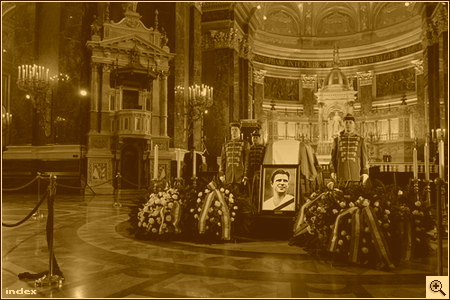|
National Day of
Mourning Saturday, Sixth Time Since Regime Change
INDEX / Hungarian News Service
8 December 2006, 21:43
This Saturday has been designated a national day of mourning to mark the
funeral of Ferenc Puskás, who passed away on 17 November, at the age of
79. Days of mourning are regulated by a government decree, issued in 2001.
Since then, 6 October has been a recurring day of mourning. There have
also been five ad hoc occasions observed since 1989.
The
government has declared a nationwide day of mourning for 9 December, the
day Hungary bids farewell to Ferenc Puskás, the Sportsman of the Nation,
who passed away on 17 November. He was 79 years of age.
According to Government Decree 237/2001, remembrance of a loss that has
shaken a majority of the population constitutes a national day of mourning.
A national day of mourning can be a singular or a recurring occasion, as
specified by the government. For special occasions, it may be extended to
cover multiple calendar days.
Entertainment Venues Not Regulated
In
compliance with the government decree, all public buildings that normally
fly the national banner have to display a black flag on national days of
mourning. Schools are required to pay appropriate tribute, either during
regular lessons or in the form of a separate event. No restrictions are
enforced upon the programmes of public entertainment venues, theatres, or
concert halls. Their compliance is optional. The decree does not apply to
newspapers or opening hours.
At a cabinet meeting on 24 November 2001, the government declared 6
October, which is the day that the martyrs of Arad were executed, a
recurring national day of mourning. This is, therefore, the only national
day of mourning which is observed annually.

On 29
November, a week and a half after the death of Ferenc Puskás, the
Gyurcsány administration issued a decree to hold a national day of
mourning on the day of the legendary footballer's funeral, as a tribute to
the "loss that has the whole nation grieving". This Saturday, in
compliance with the decree, the national flag will be raised at 9 a.m. in
a military ceremony in front of the Parliament. Subsequently, it will be
lowered to fly half-mast.
Tragedies and Funerals of Dignitaries
In the past 17 years, Hungary has observed five national days of mourning
- twice following the government decree of 2001, and three times preceding
it.
On 17 June 1989, in a "national day of mourning and remembrance", Hungary
paid tribute to the late Prime Minister Imre Nagy, his fellow martyrs, and
all the victims of the purges following the Revolution of 1956.
The day of the funeral of Prime Minister József Antall was declared a "nationwide"
day of mourning. The interim government at the time did not want to use
the term "national", caliming that it would have been contradictory to the
personality of the late prime minister.
Another national day of mourning was declared by then Prime Minister
Viktor Orbán on 31 January 1999, to mark the tragedy in Deutschlandsberg,
where 18 people perished in a bus accident.
Also during the Orbán administration, on 17 May 2002, the national banner
was raised in front of the Parliament amid military honours, then flown at
half-mast to remember the victims of a robbery in a bank in Mór that
escalated into a massacre.
The last national day of mourning to date was observed on the day of Pope
John Paul II's funeral, on 8 April 2005. In a speech remembering the late
pontiff, Prime Minister Ferenc Gyurcsány put forward the proposal that the
Parliament pay tribute to the late Pope by passing a resolution.
Source:
Index |